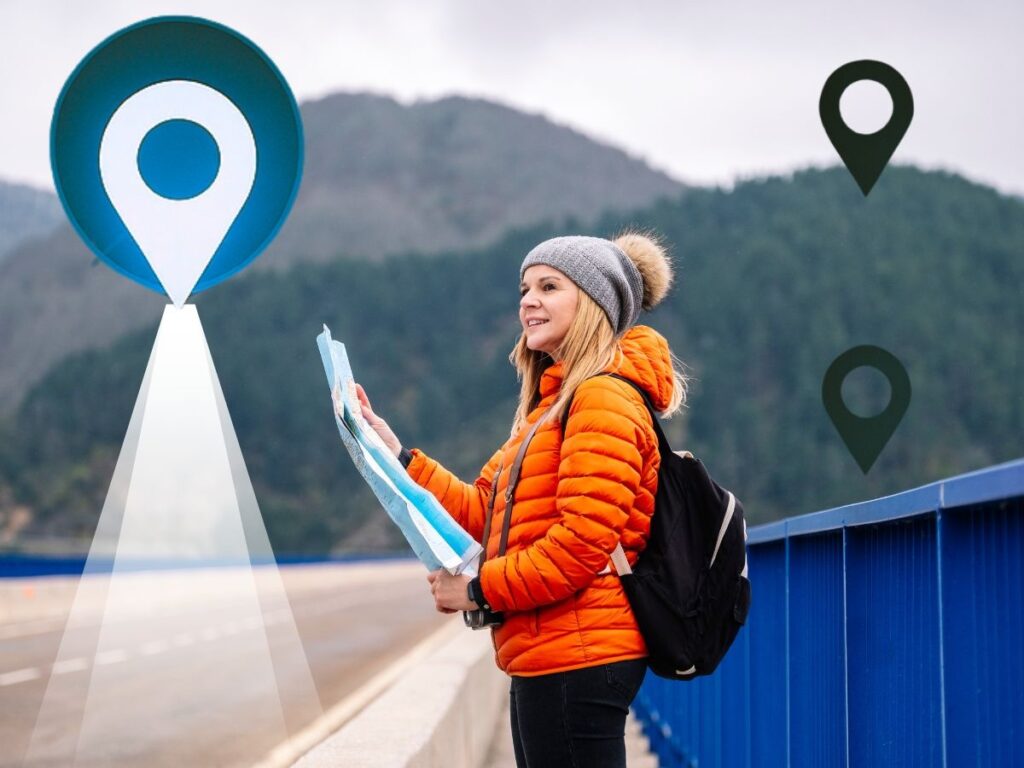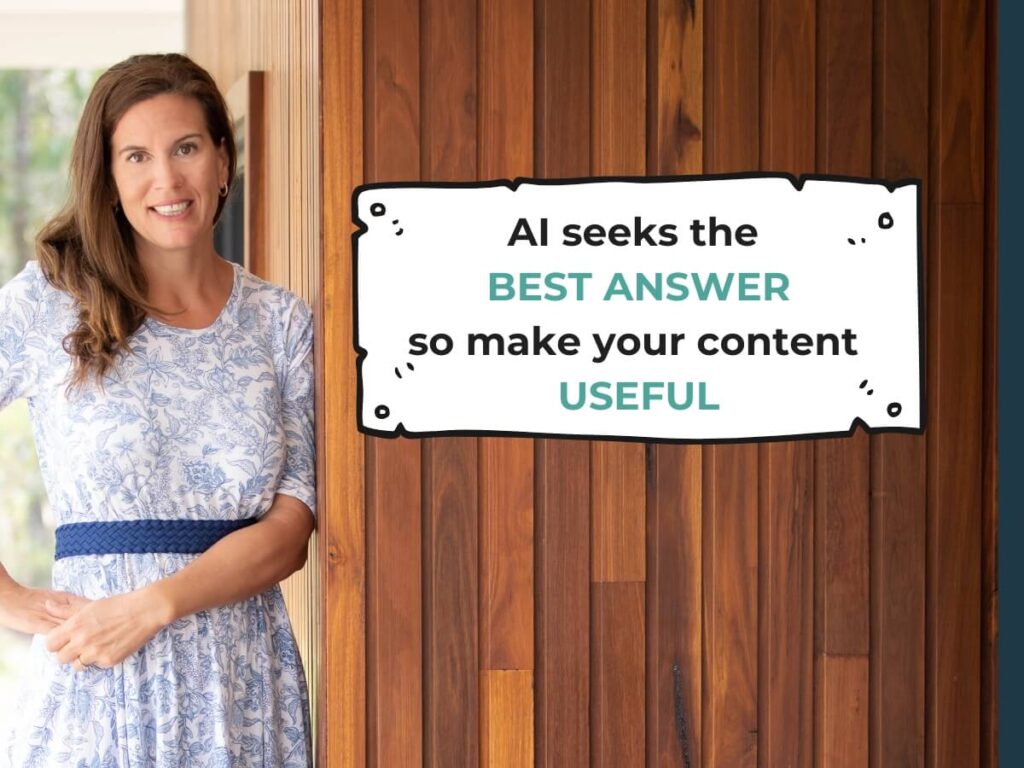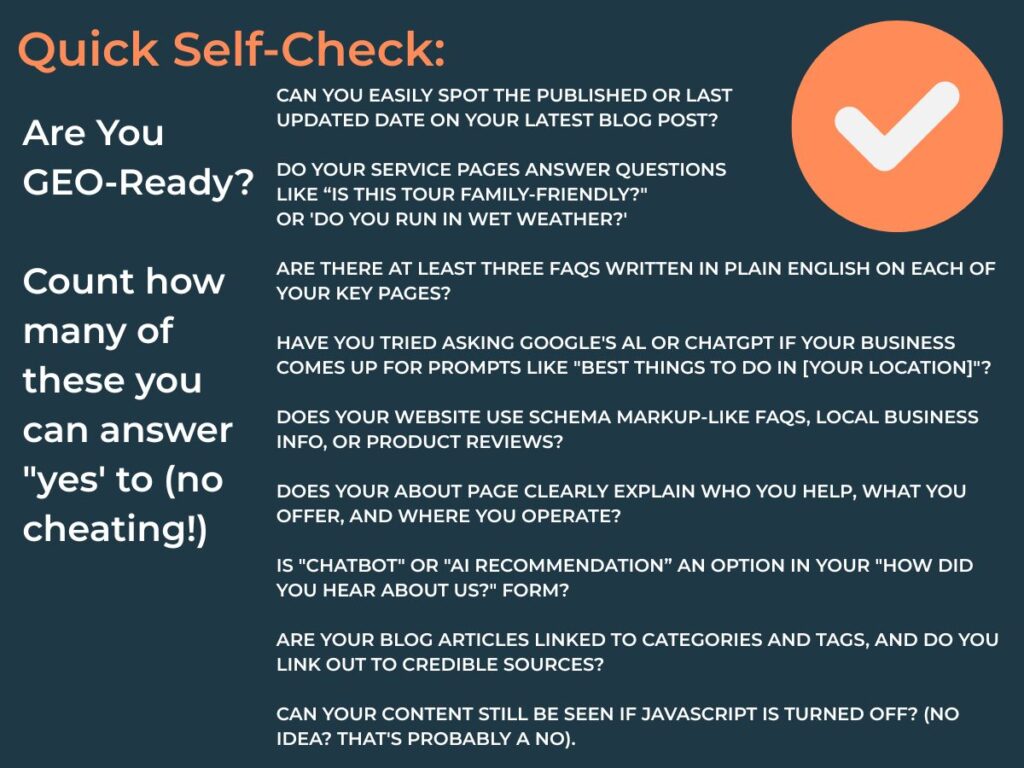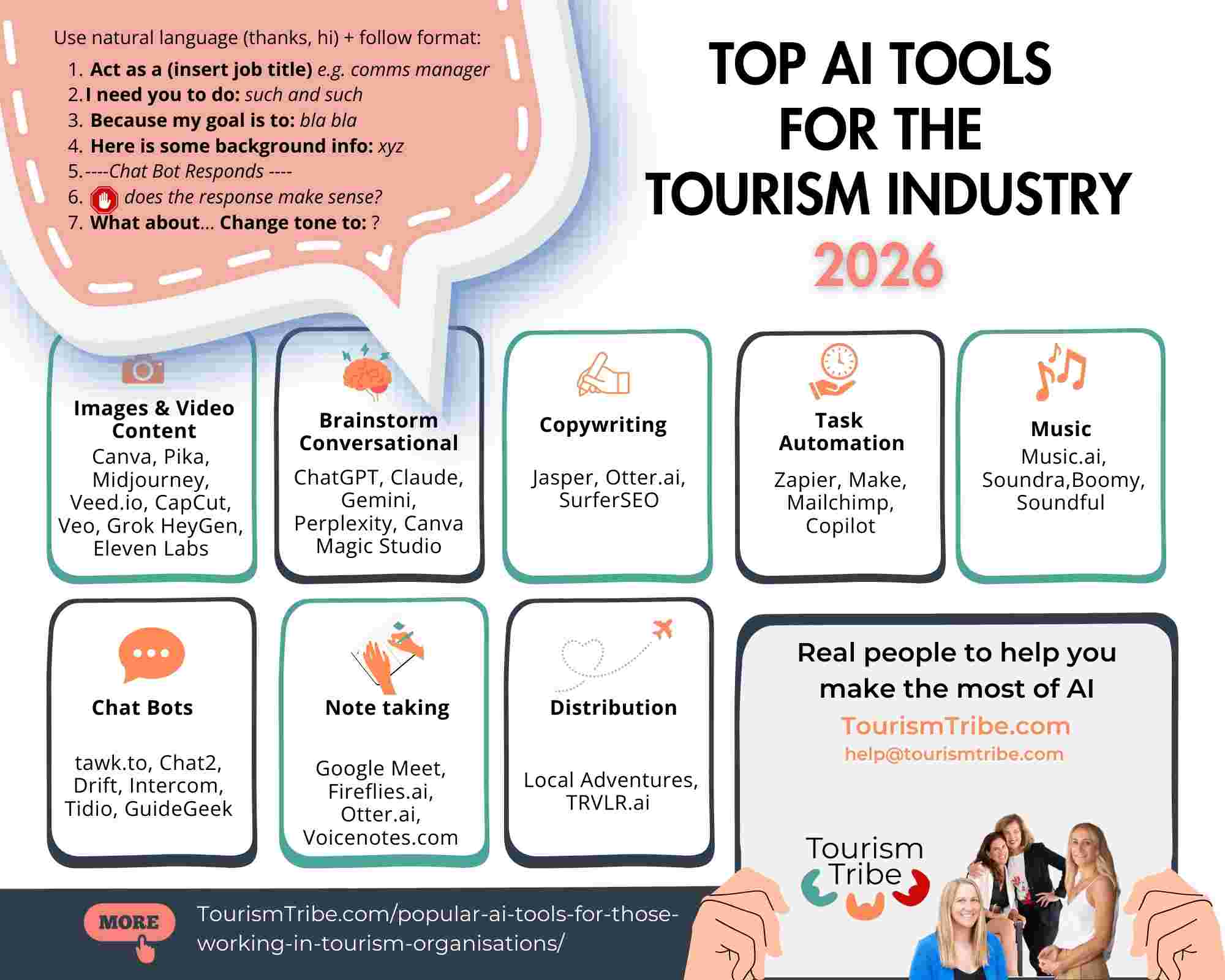
Let us help
Related articles
How ready is your Tourism Business for AI Search? | GEO Readiness Assessment
As of May 2025, Google’s rollout of AI Overviews has changed the travel search game forever. No longer are users scrolling through pages of search results—they’re asking full questions like “Where’s the best wildlife tour in Kakadu?” and receiving AI-generated answers pulled from just a handful of websites.
If your tourism business doesn’t show up in those answers, it’s not just underperforming—it’s invisible.
This is where Generative Engine Optimisation (GEO) comes in.
Unlike traditional SEO, which focuses on ranking in search engines, GEO is about creating content that AI systems like Gemini and ChatGPT can understand, trust, and use in their responses. These systems aren’t looking for keyword-stuffed pages. They want clear, structured, helpful content that mirrors how people ask real questions.

So the new question is:
Is your tourism business optimised for AI, or are your competitors getting the spotlight?
The new travel search journey starts with AI
Think about how people plan travel now:
- “Best family tours in Broome with wildlife”
- “Is there a gluten-free bakery in Daylesford?”
- “What’s the easiest reef snorkel tour from Cairns for kids?”
These aren’t keywords—they’re questions. And Google’s AI Overviews respond with summarised insights, business names, and booking links pulled from websites it understands deeply.
If your website doesn’t feed Google the right information in the right format, it’s invisible in this new AI-first world.
What does AI overview mean for your Tourism business?
- Only a Few Results Get Shown
Unlike traditional search results where you might land on page two and still get clicks, AI Overviews compress everything into a single summary. This makes it even more critical to show up early and often—or not at all. - AI Looks for Structured, Clear Content
AI parses schema, FAQs, reviews, and business details to build its summaries. If your site lacks structured data or hides content behind interactive elements (like “load more” buttons or tabs), it may not get used in AI responses—even if it’s excellent. - Fresh Content Gets Prioritised
AI needs to serve current, trustworthy information. Pages without visible publish dates or updates risk being seen as outdated—even if your offer is still valid. - Authority Comes From Clarity, Not Just Links
Google’s AI uses E-E-A-T principles (Experience, Expertise, Authoritativeness, and Trust) to decide which content to trust. That means detailed, transparent service pages and honest, human-sounding content may beat over-optimised fluff.
Real example: a missed opportunity
A regional tour company offering immersive Indigenous experiences in the Northern Territory had strong TripAdvisor reviews and good word-of-mouth but was invisible in AI answers for “authentic Indigenous tours near Darwin.”
Why? Their service page had no structured data, no FAQs, and was updated three years ago. Once these were fixed, and the content reframed for real questions (like “Is this tour family-friendly?”), visibility in Google’s AI improved—and so did direct traffic.
How do you know if you’re visible?
Start by asking Google AI and other AI engines the questions your customers might ask:
- “What’s the best eco-accommodation in Agnes Water?”
- “Can I swim with turtles on a tour near Bundaberg?”
- “Things to do in the Scenic Rim this weekend.”
Do you appear in the AI-generated answer? Or is it a competitor?
If not, it might be time to:
- Update your content for freshness and clarity
- Add schema markup (especially LocalBusiness, FAQs, and Reviews)
- Write conversational, Q&A-based content
- Ensure your images and video content are indexable
- Add structured customer reviews and testimonials
Quick self-check: are you GEO-ready?
Remember those magazine quizzes? This one’s for your website. Count how many of these you can confidently say “yes” to (no cheating!).

Read the questions
1. Can you easily spot the publish or last updated date on your latest blog post?
2. Do your service pages answer questions like “Is this tour family-friendly?” or “Do you run in wet weather?”
3. Are there at least three FAQs written in plain English on each of your key pages (and using the FAQ schema)?
4. Have you tried asking Google’s AI or ChatGPT if your business comes up for prompts like “Best things to do in [your location]”?
5. Does your website use schema markup—like FAQs, Local Business info, and Product reviews?
6. Does your About page clearly explain who you help, what you offer, and where you operate?
7. Is “Chatbot” or “AI recommendation” an option in your “How did you hear about us?” form?
8. Are your blog articles linked to categories and tags, and do they link out to credible sources?
9. Can your content still be seen if JavaScript is turned off? (No idea? That’s probably a no.)
How’d you go?
8–9 “yes” answers: 🔥 You’re a GEO rockstar! Your site is primed for AI exposure.
5–7 “yes” answers: 🧩 You’re on the right track—just a few updates away from being AI’s first pick.
0–4 “yes” answers: 👻 Oops. Your site might be invisible to the AI travel agents of today.
➡️ Ready to fix that? A GEO Readiness Assessment will show you exactly what to do.
The Shift from SEO to GEO (Generative engine optimisation)
Traditional SEO helps you appear in search. GEO helps you become the answer. This means creating the kind of content that AI models reference, not just humans clicking through search results.
- SEO = Getting clicks
- GEO = Getting picked
Frequently Asked Questions about GEO for Tourism
-
What is Generative Engine Optimisation (GEO)?
GEO is the process of making your website and content optimised for AI tools like Google’s AI Overviews, ChatGPT, Bing Copilot, and Gemini. It ensures your business is chosen by these tools when travellers ask questions like “What’s the best eco-tour in Tasmania?”
-
Why does GEO matter for tourism businesses?
AI-generated answers are now appearing above traditional search results and only list 3–5 options. If your business isn’t optimised for GEO, it risks being excluded from the results travellers actually see and trust.
-
How is GEO different from traditional SEO?
SEO gets you ranked; GEO gets you recommended. GEO focuses on structured data, FAQs, schema, service clarity, and conversational content that matches how people speak to AI.
-
How can I prepare my website for GEO?
Ensure your pages are up-to-date, structured with schema markup, answer common questions, load quickly, and display important information without relying on JavaScript. Use real language, not marketing fluff.
-
How do I know if I’m GEO-ready?
Do you show up in ChatGPT or Google AI for key prompts?
Do you have schema markup and clear service descriptions?
Is your content fresh and question-focused?
If not, consider a GEO Readiness Assessment to find out what’s missing. -
Can I measure GEO performance in Google Analytics?
Yes. Look for referral traffic from
chat.openai.com,gemini.google.com, and similar sources. Also update your contact forms with an “AI/Chatbot” option to capture those leads directly.
The solution: Generative Engine Optimisation (GEO) readiness assessment for tourism businesses
At Tourism Tribe, we’ve developed a dedicated Generative AI Visibility Assessment tailored to tourism operators. It’s based on Google’s latest guidance, the way AI engines evaluate your content, and practical steps to fix what’s holding you back.
Our assessment includes:
- AI prompt tests: Do you appear when customers ask?
- Website audit: Is your content crawlable, structured, and fresh?
- Schema and FAQ evaluation: Is your content understandable to AI?
- Benchmarking: How do you compare with top AI-recommended competitors?
Optional upgrades include:
- A Looker Studio dashboard to track AI traffic
- A 1-on-1 strategy session to action your insights
- A quarterly GEO update to future-proof your online presence
Don’t miss the AI moment
AI isn’t the future, it’s the now. If your tourism website isn’t ready, you’re not just behind—you’re off the radar. But it’s still early – you could have a real competitive advantage.
Learn more about our GEO readiness assessment here.
Let’s make sure your business becomes the answer in AI search—not the afterthought.

Generative Engine Optimisation (GEO) assessment of your online presence
GEO stands for Generative Engine Optimisation, the process of preparing your website to be chosen by AI tools like Google’s AI Overviews, ChatGPT, and Bing Copilot. This assessment shows how visible your tourism business is in these new AI-powered search results—and gives you a clear action plan to boost your exposure.
Where to from here?
Top AI Tools for the Tourism Industry - Free cheatsheet

